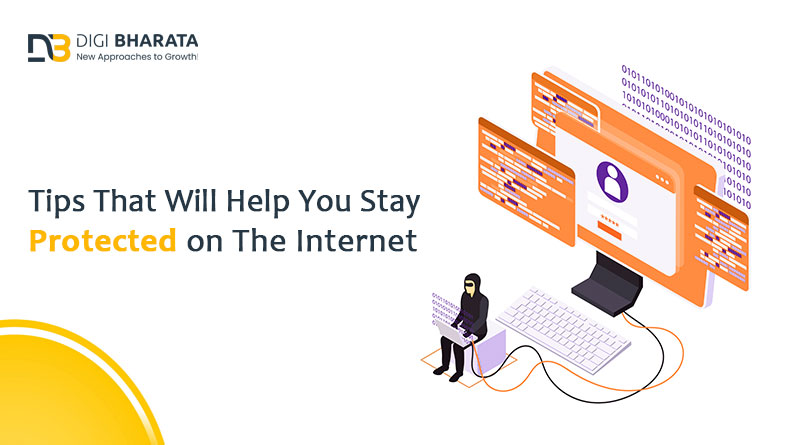We know how important it is to keep your computer, tablet, and phone protected from malware and all sorts of cybercrimes. You never know who may be getting into your personal information or what they could do with it if they have access to it. But who has the time to go through all the settings on each device? The Internet is full of things that are just waiting for you to click on them so they can do something bad. It’s enough to make your head spin!
Table of Contents
Tips to Protect Yourself on the Internet
Don’t worry; we’re here for you! Be sure to check our list of safety protection softwares. Here we’ve come up with a list of 10 things you can do in less than five minutes that will help protect you from almost anything on the web. Let’s start!
Enable a Strong Password
Research shows that more than 80% of all cybercrimes could be prevented if people changed their passwords every thirty days. What else do you have to lose?
Use Ad-Blockers on All Your Devices
Indeed, AdBlocker is a perfect solution, as it will get the job done and at least keep you from having to see ads that could lead you down the wrong path. A lot of times, these are ads for things like adult websites or even for fake antivirus software.
Update All Your Software Regularly
It’s important to update not only the apps you use on your computer but also the operating system itself. If this is something you don’t want to do, look for an automatic update program that will tell you when it’s time to update, then do it for you automatically and let it know when it’s done so that you can confirm that nothing has been damaged in the process.
Keep Anti-Virus Software Updated Religiously
If possible, get some software that will automatically scan all of your files as well as your operating system regularly to make sure that everything is still working as well as it should be.
Only Use The Safe Search on Your Internet Browser
We know you don’t want to do this, but the truth is that Google and Bing are notorious for showing people ads that are completely unrelated to what they were searching for. If you want to be sure that you’re only getting the best personal results, take this step and be sure to check all the other options as well.
Change Your Default Search Engine
Just like we recommended above, you will probably not want to set your default search engine to anything other than Google or Bing, but there are times when you may need another one that’s more trusted. Just make sure that you’re careful about what it is and that you’ve checked it out thoroughly.
Click on Links Only If You Know Who They Are Coming From
We all do it! It would be so much easier to skip the hassle if we just knew for certain who was sending us this link or the link to an interesting article, but no one wants to take those chances. Just make sure you’re doing this to a site that is verified and trustworthy before clicking on anything at all. If a lot of people are recommending something, it’s probably worth paying attention to as well.
Never Click on a Link Sent to You By Someone You Don’t Know
This tip may seem obvious, but it’s something that a lot of people struggle with. We all want to find new content that we haven’t seen before and we always want to be up on the latest news, but it’s best to be sure everyone is who they say they are before clicking anything.
Use a VPN Whenever Your Device is Not Being Used
The best way to help protect your identity online is also the easiest one: use a VPN every time you’re using your computer or phone for anything other than work or school. There are a lot of free VPNs out there that work well, but be careful with these and make sure they’re not being used to steal your personal information. We recommend you stick with the big names in the business.
Use Parental Controls on Your Devices
Many people don’t use parental controls because they’re still trying to figure out what all the settings do and where everything is, but you need to make sure that your kids have no access to this stuff by looking over their shoulder every time they try something new. You should always be aware of what your children are doing online no matter how old they are.
What Threats Are Out There?
As you can see, these tips give you the best way to protect yourself from almost anything on the Internet. But malware and phishing sites are going to be one of the biggest problems for nearly everyone, so let’s go over a few of them now.
Even though it may sound silly, you should always check your email to make sure that nothing has been sent to you from someone you don’t know. Once it arrives in your inbox, it’s virtually impossible to know what the sender is after, so please be careful. It could be something like an ad for a fake antivirus program or something else entirely.
The best method of protecting yourself from phishing sites is to make sure you have a VPN on at all times, but there are also some other things you can do that will help you protect your identity as well.
We live in a world where everyone is on their computer all the time, so it’s not hard for someone to get your attention by posing as a friend and asking you to click on a link. This goes double if they begin asking personal questions or anything else that could be considered private.
Conclusion
These tips and tricks should help you protect yourself from almost anything in the online world. Just follow these steps, and you’ll have nothing to worry about. Stay safe online!
Even though computer security is a big topic, most people don’t need to know as much about it as possible to feel more secure every day. It’s important to help keep your family’s computer information safe and not have to worry about anyone trying to steal information from them.






















+ There are no comments
Add yours